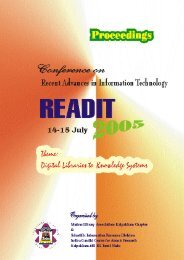READIT-2007 - Indira Gandhi Centre for Atomic Research
READIT-2007 - Indira Gandhi Centre for Atomic Research
READIT-2007 - Indira Gandhi Centre for Atomic Research
Create successful ePaper yourself
Turn your PDF publications into a flip-book with our unique Google optimized e-Paper software.
FROM MANAGEMENT OF ORGANIZATIONAL KNOWLEDGE<br />
TO MANAGEMENT OF ORGANIZATIONAL MEMORY<br />
K.K.Kuriakose*, H.Seetha*, S.A.V.Satya Murty*, S.Athinarayanan* and P.Swaminathan *<br />
Abstract<br />
Globalisation ubiquitous computing and knowledge centric view of the organization has brought<br />
knowledge management to the central stage in many organizations. Knowledge management enables<br />
organizational knowledge to grow flow and create more value in the organization. Knowledge Management is<br />
the process by which organization generates wealth from its knowledge based assets.<br />
Organizations which were initially concentrating on in<strong>for</strong>mation management, started moving to<br />
knowledge management then to organizational memory and organizational learning. Organizational memory is<br />
the combined repository of data, in<strong>for</strong>mation and knowledge across the organizational boundaries captured in<br />
accessible repositories. These repositories consist of documents, computers, people and culture. Any<br />
progressive organization will be continuously acquiring, updating, storing and managing the memory <strong>for</strong><br />
making it available to all the relevant employees and improving the organizational effectiveness. Organizational<br />
learning uses organizational memory as its knowledge base. The effective utilization of organizational memory<br />
will result in organizational learning and improved organizational per<strong>for</strong>mance.<br />
This paper discusses the management of organizational memory and organizational learning and its<br />
relationship to in<strong>for</strong>mation management and knowledge management. It also discusses a conceptual frame<br />
work <strong>for</strong> management of organizational memory in a large <strong>Research</strong> and Development Organization.<br />
Key words: Knowledge Management, Organizational Memory, Organizational Per<strong>for</strong>mance<br />
INTRODUCTION<br />
Knowledge Management is a conscious strategy of getting the right knowledge to the<br />
right people at the right time, and helping people share and put knowledge into action <strong>for</strong><br />
improving the organizational per<strong>for</strong>mance. The key concept is ‘organizational per<strong>for</strong>mance’<br />
or ‘productivity improvement’. If the usage of computers <strong>for</strong> productivity improvement can<br />
be analyzed, it can be seen that the starting point was basic data processing systems. Data<br />
processing systems process transactions and produce reports. It represents the automation of<br />
fundamental, routine processing to support operations. For this purpose Electronic Data<br />
Processing(EDP) departments were set up in many organizations. The idea of using the<br />
in<strong>for</strong>mation captured in transaction processing system <strong>for</strong> decision making gave birth to<br />
Decision Support Systems(DSS), Management In<strong>for</strong>mation Systems(MIS), Enterprise<br />
In<strong>for</strong>mation Management (EIM) etc, though the contribution from data processing system is<br />
minimal . In a similar way is the idea of ‘Knowledge Management’ has evolved from<br />
‘In<strong>for</strong>mation Management’ ? There are contradicting views on this. In this paper we consider<br />
‘Knowledge Management’ as different from ‘In<strong>for</strong>mation Management’ and the only<br />
similarities are both aids in improving organizational productivity and both use ‘In<strong>for</strong>mation<br />
Technology’ like computers , networks etc.<br />
Organizational Memory(OM) can be defined as a set of repositories of data,<br />
in<strong>for</strong>mation and knowledge that the organization has acquired and retains over a period of<br />
time. Stein and Zwass (1995) define OM as the means where by knowledge from the past is<br />
brought to bear on present activities resulting on higher or lower levels of organizational<br />
* Electronics and Instrumentation Group, <strong>Indira</strong> <strong>Gandhi</strong> <strong>Centre</strong> <strong>for</strong> <strong>Atomic</strong> <strong>Research</strong><br />
190

















